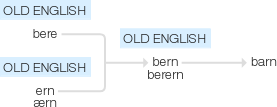Barn
Old English bern, berern, from bere ‘barley’ + ern, ærn ‘house’.
wiktionary
From Middle English bern, from Old English bearn, bern, contracted forms of Old English berern, bereærn(“barn, granary”), compound of bere(“barley”) and ærn, ræn(“dwelling, barn”), from Proto-West Germanic *raʀn, from Proto-Germanic *razną (compare Old Norse rann), from pre-Germanic *h₁rh̥₁-s-nó-, from Proto-Indo-European *h₁erh₁-(“to rest”).
More at rest and barley.
For the use as a unit of surface area, see w:Barn (unit) § Etymology.
From Middle English barn, bern, from Old English bearn(“child, son, offspring, prodigy”) and Old Norse barn(“child”). Doublet of bairn. Cognate in Frisian: bern (child/children).
etymonline
barn (n.)
"covered building for the storage of farm produce," Old English bereærn "barn," literally "barley house," from bere "barley" (see barley) + aern "house," metathesized from *rann, *rasn (source also of Old Norse rann "large house," Gothic razn "house," Old English rest "resting place"). For the formation, compare Old English sealtærn "saltworks," horsern "stable." In Anglo-Saxon England, barley was a primary grain crop.
Barley was not always the only crop grown as the data recovered at Bishopstone might suggest but it is always the most commonly represented, followed by wheat and then rye and oats. [C.J. Arnold, "An Archaeology of the Early Anglo-Saxon Kingdoms," 1988, p.36]
Another word for "barn" in Old English was beretun, "barley enclosure" (from tun "enclosure, house"), which accounts for the many Barton place names on the English map, and the common surname. Applied from early 18c. to any large, barn-like building. Barn door has been used figuratively for "broad target" since 1670s and "great size" since 1540s. Barn-owl attested by 1670s. Barn-raising "a collective effort by neighbors or community members to erect the frame of a barn for one of them, accompanied by a social gathering" is attested by 1849.
